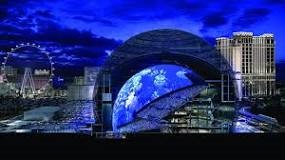
A Study in Contrasts
If time starts moving any faster I may end up with whiplash. Or maybe I already have it. Here it is, the first month of 2024 already gone. These days when people expect me to know what the date is, I fail. Most of the time I even question the day, and can only keep things straight by knowing where I need to be for at any given time: Monday yoga, Tuesday hike, Wednesday cycling, etc.
Which is why an article in the current issue of Harper’s spiked my interest.
But first, let me tell you about a trip Jay and I took to Las Vegas in December. Not to work the slots or roulette, but to see U2 perform at the new technological wonder called Sphere. I, of course went to see one of my favorite bands; Jay to check out the venue which is the largest spherical building and venue in the world. But more than size, this phenomenon is a scientific wonder. And for me, the most fantastic immersive entertainment experience I would expect to find today.
The exosphere contains 580,000 square feet of LEDs; 1.2 million LED “pucks” display video content which supposedly can be seen from outer space. This photo shows the backdrop of the Vegas skyline; if I had been plopped down in my seat unwittingly, I would have sworn I was outside.

Hundreds of interlocking triangles create the spherical shape. The Statue of Liberty can fit inside. Seating is an incline and all views are spectacular because you are in it. The sound and imagery are felt by every nerve in your body.
And it helps to have The Edge’s distinct clanging guitar sound and Bono’s still strong vocals to add to the digital artistry around you. Based on their 1990’s album “Achtung Baby” the concert also included such mega hits as “I Still Haven’t Found What I’m Looking For.” Listen to that with a sound system that includes 167,000 amplified loudspeaker drivers,1,586 permanently installed and hundreds more mobile modules.
Having owned a security and sound integration company for twenty years, Jay and I watched the technology evolve from analog tape recorders and cameras to amazing digital identification such as biometrics. When we sold in 2019, the capabilities were way beyond what I could have imagined just a few decades ago. And now this. Wow.
So, now on to the article in Harper’s Magazine.
Written by Rachel Kushner, she tells the story she heard about the Sentinelese, a hunter-gatherer tribe that lives secluded on North Sentinel Island, in the Andaman archipelago of the Bay of Bengal. For hundreds of years they have repelled visitors. Very little is known about them, because the few visitors that have attempted contact or outstayed their welcome have not lived to tell the tale. North Sentinel Island is about 23 square miles and surrounded by coral reefs, with few natural places to land a boat.
Based on a visit to a Sentinelese village in 1967 (which did not end in death, and so could be recounted) there may be as few as fifteen or as many as a few hundred. (probably the latter is true, otherwise inbreeding would eventually have wiped them out). They live in lean-to huts and are, for the most part, naked, choosing to decorate their bodies with necklaces and bracelets made from natural items such as stones and shells. They build outrigger canoes which are used for fishing and harvesting crabs. Like all hunter-gatherers, they subsist on naturally grown fruits, tubers, and other edibles. There is no indication of farming practices.
They hunt with bows and arrows, use knives and spears and seem to be proficient in all. Reports from the few visitors who survived to tell their tale, the language is unique and no one has been able to translate. For a while, a group of anthropologists made trips with gifts of coconuts they left on the beach which were received but never reciprocated, and they were never invited to venture inland. When the natives felt disrespected, they gathered in a group, turned their backs on the anthropologists and sat on their haunches in a mime of defecating. When that didn’t work, the bows and arrows did. The visits stopped in 1996.
When a tsunami hit in 2004, the Indian Coast Guard flew helicopters over the land and were attacked by arrows. After a wayward American tourist landed on their beach and refused to stay away, he is believed to have been killed and his remains buried. The Indian government later declared that the Sentinelese be left alone. They are believed to be the most isolated people in the world, and are thought to be directly descended from the first humans to come from Africa 60,000 years ago.
My point to all this? A study in contrasts. The Sphere creates a reality that the senses think are real, but are not. The islanders live in the simplest way necessary for survival and tenaciously, stubbornly, insist it continues.
I often think about the changes in our world over just the last hundred years. All the things my 97-year- old father has seen. What I have taken notice of over just the last twenty years. I have often sat and wondered how much of our humanity we will lose in order to live/survive within our rapidly advancing technological world. Our ways of communicating, of all our services that are almost impossible to do now without a cell phone or PC. (Please set up an account to continue) Mankind’s capabilities are endless. Can we, should we, be more like the Sentinelese and just say no? But hard cold technology gives us the wonder and beauty of anything we wish to experience in our oh so short time on the planet. What can we do without?
Of course the Sentinelese have their own culture with rules and hierarchies and kerfuffles. It’s inevitable in order to live together. But when every day is lived in the present, and every gift from the land appreciated and even revered, there is time for singing. And orgies. (Both have been reported.) I wonder if the most primitive tribe in the world is happier than we are.
I think yes.
Undated photo of Sentinelese fishing. Released by Anthropological Survey of India. Forbes issue November 30, 2018

